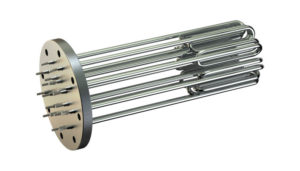4 Types of Immersion Heaters and Their Industrial Uses
Last updated on April 19th, 2025 at 11:40 am
The term “immersion heater” refers to more than just one type of machine — it’s a broad label. There are four key categories of immersion heaters, each with slightly different designs, mechanisms of action, and intended uses. This post will analyze these heaters’ differences and which work best for specific applications.
Flanged heaters
 Flanged heaters act as a source of direct heat to a liquid medium. They typically use hairpin elements or tubular bugle elements that extend from the flange’s face.
Flanged heaters act as a source of direct heat to a liquid medium. They typically use hairpin elements or tubular bugle elements that extend from the flange’s face.
These heaters usually contain thermowells that allow for the use of temperature reading devices such as thermocouples and thermostats to provide better temperature control.
These devices also have limit sensors to prevent overheating and damaging heater elements.
Industrial uses of flanged heaters
Typical uses for flanged heaters involve chemical, petroleum and water-based applications. That includes processing corrosive liquids, lubricant oils, heavy and light oils, and demineralized or deionized water. Additionally, flanged heaters are often used to process soaps, detergents and other caustic solutions.
Benefits of flanged heaters
- Easy installation
- Easy to operate
- Easy to maintain and repair
- Ideal for applications with high kilowatt output
- Customizable for various dimensions and conditions (i.e., explosion-proof)
- CSA, CSA U.S. & UL approved
Circulation heaters
Circulation heaters have a wide range of applications, making them a highly-prized type of industrial heater. The target fluid enters through an inlet that’s closest to the heater.
The heater then applies heat to the liquid as it flows within a vessel. The fluid then exits the outlet and circulates through a piping circuit. How these heaters function within specific industrial applications can vary slightly.
Industrial uses of circulation heaters
Circulation heaters facilitate processes throughout various industries, especially those involving process liquids. That includes oil, water, solvent, gas and other process mixtures. For example, oil and gas companies pump crude oil through circulation heaters to modify their viscosity for a better flow.
Benefits of circulation heaters
- Easy installation and compact fit
- High energy efficiency
- Quick response and even heat distribution
- High wattage in small heater bundle
- Provides max dielectric strength
- Reduces heat loss from the vessel chamber
- Compatible with multiple industry safety standards
Over-the-side heaters
 Over-the-side heaters are a type of immersion heater designed for installation outside of a tank or vessel.
Over-the-side heaters are a type of immersion heater designed for installation outside of a tank or vessel.
Usually, they are installed in the upper portion of the vessel, with brackets fastening the heater onto the tank wall.
Over-the-side heaters often use copper, steel, cast alloy or titanium in their heating elements.
Due to the mobility of these heaters, project managers often use them for multiple vessels (and applications).
Industrial uses for over-the-side heaters
Many industrial applications require targeted heating, but a traditional immersion heater may not suffice. That’s where over-the-side heaters come in as a suitable alternative. These applications include heating oil processing, degreasing, and caustic solutions.
Benefits of over-the-side heaters
- Easy installation
- Lightweight construction
- Maximizes heat transfer
- Moisture resistance
- Provides uniform temperature
- Resistant to corrosion and oxidation
- Portable and mobile
Screw plug heaters
Screw plug heaters are submersible heating elements that go directly into the tank or vessel. They deliver a direct transfer of heat, which allows liquids to heat up rapidly. Screw plug heaters contain hairpin tubular elements that are either brazed or welded into a pipe thread fitting. Screw plug heaters are ideal for smaller containers and vessels.
Industrial uses for screw plug heaters
The use of screw plug heaters is broad and spans many industries. They’re used in laboratory facilities, food processing, and applications involving flammable substances. However, they are suitable for most applications using smaller vessels.
Benefits of screw plug heaters
- High energy efficiency
- Easy to control
- Easy installation/removal
- Easy maintenance
- Can be customization
- CSA™ and UL approved
How to choose the right type of immersion heater for your industry
Depending on your application, the kind of immersion heat you need will likely be apparent. Of course, there are cases where you will need to assess the demands of particular processes and which immersion heater will best suit your needs. That may mean carrying out specific calculations and determining cost-benefit analyses.
Also read: Alternatives to Direct Immersion Heaters
However, our Wattco representatives can advise you on what heater might work best for your industry. They work alongside engineers and scientists who can make precise recommendations for the application you need a heater for.
Get in touch with a Wattco representative to help you determine the best immersion heater for your application.
